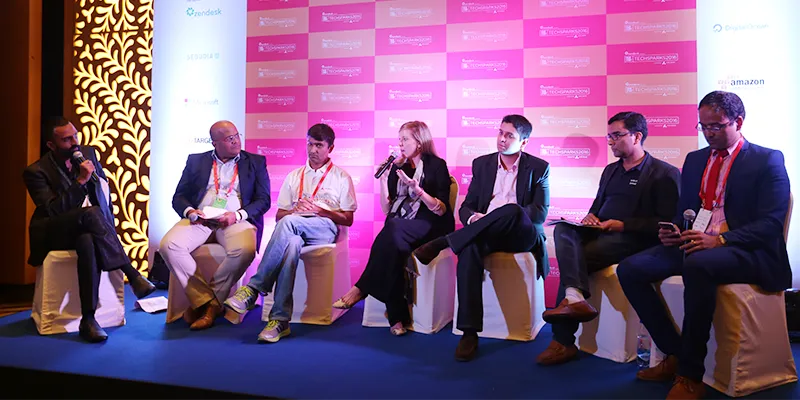TechSparks 2016: Exploring the new frontiers of FinTech
Fintech startups seems to be in vogue in the India startup ecosystem. According to YourStory Research, $1.2 billion has already been invested in fintech startups in the last two years. In fact the number of fintech startups funded in the first half of 2016 equals the total number of startups funded in the sector in 2015.
Fintech companies are using technology in a big way to define and make the existing financial systems a lot more efficient and effective. At the seventh edition of TechSparks in Bengaluru on 30th October, panel on ‘The new frontiers of fintech’ saw some industry experts come together. The panel comprised Adil Shetty, CEO of BankBazaar, Lizzie Chapman, CEO of ZestMoney, Markandey Upadhyay, Axis Bank, Naveen Kukreja, Co-founder and CEO, Paisabazaar, Pankaj Naik, Director, Digital Media and Technology, Avendus and Shashank R, Co-founder and MD, Capital Float.

Digitalisation of the banking sector
As Lizzie pointed, its an oft heard phrase “People don’t need more banks, people need banking!” and technological implementations have the ability to take banking solutions to the living room of the masses.
Markandey Upadhyay from Axis Bank was of the view that the question was not of intent among legacy large banks. According to him unfortunately in India, the executive leadership is tied down with pockets that are not as deep; typically the IT budget in India is 3-5%, which compares poorly to the global average of 10-12%. So while banks have the intent and desire to go digital they probably don’t have as much bandwidth to experiment with.
This is where the fintech companies have a genuine opportunity. And more importantly banks realise that. Axis bank for example, shared Markandey, has created a separate unit called 'Thought Factory' to deal with startups.
Understand the customers desire
What the fintech wave in India is doing today is taking banking to the consumer who in Adil’s words is a consumer who sits on a couch on a weekend with his family and orders grocery and food by a click. So what he wants is to be able to take those banking related calls on investments and borrowings right from there.
Clearly the customer is ready for this change, the demand for going paperless in terms of paperless financial products already exists. The customer is ready. So the onus is on the banking fraternity. By that I mean bank and fintech companies to make that paperless transaction from that front room couch a reality.
Own your customer
Adil spoke about how it is relevant today that the fintech companies own the customer and the customer data. His thoughts were quickly re-enforced by Markandey from Axis Bank who reiterated that banks love fintech firms who genuinely know their customers.
There needs to be a relationship and loyalty with the fintech firm as well. Very often banks are not really convinced with the explanation on the machine learning capabilities of the products. As per Naveen, Banks have a desire to enhance customer experience and increase their customer base. While fintech firms have the opportunity to reduce the time it takes to assess these customer demands thereby improving the overall customers experience.
Clean up the clutter around data science
Lizzie felt that there is some genuine investment required by fintech firms to come up with analysis by putting some money and building enough proof of concepts to ratify which are the alternative data points that are trustworthy. Right now, the jury on reliable alternate data points is still out, and there is too much speculation on what really would give a good indication on the capacity and character of the individual. Along with the ability to use social pressure of loss of face as a defaulter as acceptable collateral.
Target audience and Execution
As Pankaj pointed out that it is the segment of small and medium business owners in small towns who borrow from uncles and aunts at 4% to 5% a month who will benefit from the fintech revolution by probably getting loans at less than half of that interest rate!
That said, as per Shashank,
once this alternate data sets are accepted as the norm, we will find that there is a large pool of Indians who are credit poor but are data rich who can benefit from this alternate banking system.
What all the panelists agreed upon was that the sector is making an effort to make itself more aligned to the available tech around us and banks are reaching out to fintech startups to leverage them as partners to take banking further.
A big shoutout to all our sponsors - Zendesk, Axis Bank, Sequoia Capital India Advisors , Digital Ocean, Microsoft, AWS, Akamai, Target, Verisign, Kerala Startup Mission, Brand Launch Centre, Tork and Blink.







